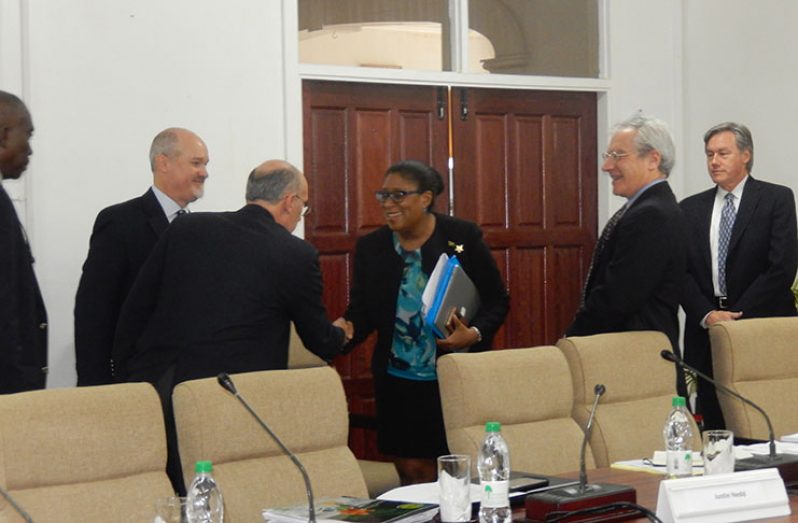GOVERNMENT through the Ministry of Public Telecommunications on Friday began discussions with the Guyana Telephone and Telegraph Company (GTT) and its parent company Atlantic Tele- Network International (ATNI) in preparation for the transition to a liberalised telecommunications sector.
In July, the APNU+AFC coalition Government passed the Telecommunications (Amendment) Bill 2016, which paved the way for liberalisation of the sector.
That legislation was first introduced in 2011 and was revised in 2013 under the People’s Progressive Party Civic (PPP/C) administration.
The Telecommunications Bill had been placed before the Special Select Committee in the 10th Parliament and was near completion when former President Donald Ramotar prorogued Parliament in 2014.
Government was represented by subject Minister Cathy Hughes, Vice-President and Minister of Foreign Affairs Carl Greenidge and ministerial advisors on Information and Communication Technology (ICT) and Telecommunications, while GTT/ATNI was represented by GTT’s Chief Executive Officer (CEO) Justin Nedd and ATNI’s Vice-President, Government and Regulatory Affairs Doug Minster and other company executives.
“These discussions come on the heels of Guyana’s landmark telecommunications legislation, which is aimed at ending the exclusivity of fixed line, international voice and data services, and attracting investments to the ICT and telecommunications sector, thereby increasing affordable Internet access,” the statement said.
According to the Ministry of Public Telecommunications, the discussions were cordial, positive and productive, with both sides expecting the talks to conclude “as soon as possible” to each party’s satisfaction.
Meanwhile, during her 2017 budget debate presentation, Minister Hughes disclosed that of her $1.58B allocation in the budget, $114M has been allocated for the provision of proper Internet access to over 600 Government buildings across the country.
These public Internet access points, she said, will increase the opportunities and channels through which thousands of Guyanese would be able to access online resources, in keeping with the Government’s aim to reduce the digital divide and to improve interconnection and association with Government.
She disclosed that several post offices will be transformed into ICT hubs providing much-needed internet access to citizens, while making access to Government services easier.
Another $ 90M will be used to provide ICT access for the hinterland regions as well as far and remote areas across Guyana, and according to Hughes, there is a plan to expand the reach of Government services to the hinterland; and community ICT hubs will be established in Annai, Lethem, Waramadong, Paramakatoi, Aishalton, St Cuthbert’s Mission, Bartica, Mabaruma, and Kwakwani, to name a few.
“The aim… is to improve the livelihoods of persons and to reduce the digital divide that exist between the coast and the hinterland, the haves and the have nots.”
Additionally, another 30 pilot community ICT hubs serving approximately 60,000 residents will be established in Regions Two, Four, Five and Six while Regions One, Seven, Eight, Nine and 10 are being considered for similar development.
“All of this would be accommodated through the e-government network; therefore maintaining and expanding the reach of this network is of critical importance,” said Minister Hughes.
Some $435M has been allocated for this activity, while $70M was budgeted for the expansion of the network into unserved areas including Timehri, Amelia’s Ward, and Diamond among other locations.
Earlier this year, when the Telecommunications Bill was passed, Hughes described the legislation as “a breakthrough legislation,” which represents a significant and tangible indication of her Government’s commitment to the advancement of Guyana.
Above all, the Minister of Public Telecommunications made it clear that the telecommunications sector will become competitive and flexible to meet the needs of a modern and rapidly evolving technological world.
It is expected that when the sector becomes fully liberalised, it would attract new market entrants as well as investors, thereby providing more choices, better quality service and lower prices to consumers.


.jpg)











